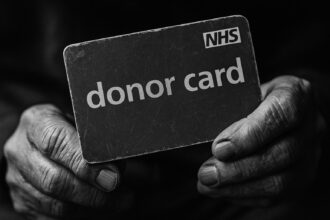First Minister John Swinney has engaged in talks with his 14-year-old son to better understand youth perspectives amid rising knife crime in Scotland, following tragic deaths and growing public concern. His government responds with proposed reshuffles and renewed support for vulnerable citizens, emphasising the need for community involvement and holistic strategies.
In a heartfelt moment reflecting on the recent surge in youth knife crime, First Minister John Swinney has turned to his 14-year-old son, Matthew, for insights on this pressing issue. This conversation follows a series of tragic incidents, most notably the death of 16-year-old Kayden Moy at Irvine Beach, which has shocked the nation. Swinney, acknowledging the heartbreak of these events, revealed in an interview that hearing from Matthew has helped him understand the concerns young people face today.
Swinney’s engagement with his son came in the wake of a campaign led by concerned parents, notably Vicky Donald, who wrote a compelling open letter to the public, urging immediate action to stem the tide of violence. In response to this letter, the First Minister expressed the importance of not only listening to the youth but also incorporating their perspectives into governmental actions. He stated, “I share the worries that Vicky Donald has expressed and I talk about these things to my son,” highlighting the dual role he plays as both a leader and a parent.
Concerns about youth violence extend beyond individual tragedies, echoing a broader societal issue. Over the past year, Scotland has seen three young lives lost to knife attacks. The statistics surrounding knife crime in Scotland have fluctuated, but initiatives aimed at reducing these incidents have shown promise. Historically, the Scottish Violence Reduction Unit has addressed violent crime as a public health issue, advocating programmes like ‘No Knives, Better Lives’ to shift societal attitudes and prevent youth violence. These strategies have reportedly contributed to a significant decrease in knife-related deaths among young people, demonstrating the potential for effective, community-driven solutions.
However, as experts warn, the shifting landscape of youth violence—with increasing instances influenced by social media and peer pressure—presents new challenges. Alex O’Kane, an authority on youth safety, cautioned that without urgent and focused action, the cycle of violence may continue to escalate, especially as young individuals seek validation through aggressive means online. This underscores the necessity for a holistic approach, involving the community in dialogue and intervention efforts.
Swinney’s government has acknowledged these challenges and is reported to be preparing a summer reshuffle in response to public concern and changing dynamics within Scottish politics. With political pressures mounting due to rising knife crime and the ongoing cost-of-living crisis, Swinney’s government has also pledged to restore winter fuel assistance that had been recently cut by the opposition Labour Government, stressing the inequities faced by vulnerable citizens.
In a related context, discussions surrounding the potential reform of prostitution laws have emerged within the government. Swinney has indicated a cautious approach towards proposed legislation aimed at criminalising those buying sex, seeking to strike a balance between addressing the issue and carefully considering the details of the bill.
As Scotland grapples with the multifaceted challenges of youth violence, the importance of conversation—whether between a father and son or between governmental leaders and community members—remains vital. Swinney’s willingness to engage with his son on such serious matters not only reflects his personal concerns but also highlights a broader commitment to seeking input from the next generation as the government strives to formulate effective policies that protect its youth.
The continuing dialogue around knife crime reminds us that meaningful change will require collective action, community engagement, and, above all, a recognition of the shared responsibility borne by all citizens to ensure a safer environment for future generations.
Reference Map:
- Paragraph 1 – [1], [6]
- Paragraph 2 – [1], [2]
- Paragraph 3 – [2], [5]
- Paragraph 4 – [7]
- Paragraph 5 – [1], [3]
- Paragraph 6 – [1], [4]
Source: Noah Wire Services
- https://www.dailyrecord.co.uk/news/politics/john-swinney-turns-teenage-son-35289841 – Please view link – unable to able to access data
- https://www.theguardian.com/membership/2017/dec/03/how-scotland-reduced-knife-deaths-among-young-people – This article examines Scotland’s successful strategies in reducing knife crime among young people. It highlights the establishment of the Scottish Violence Reduction Unit, which treats violent crime as a public health issue, and the implementation of the ‘No Knives, Better Lives’ programme aimed at preventing youth violence. The piece also discusses the decline in knife-related deaths and the broader cultural shift towards viewing violence as a societal problem requiring collective action.
- https://hansard.parliament.uk/Commons/2019-03-04/debates/8EC5635F-DD3F-457A-9077-E536F9D8D61C/details – In this parliamentary debate, the effectiveness of Scotland’s approach to tackling knife crime is discussed. The creation of a violence reduction unit and the ‘No Knives, Better Lives’ programme are highlighted as key factors in the significant reduction of knife-related incidents. The debate also touches upon the potential for other regions to adopt similar strategies to address youth violence.
- https://hansard.parliament.uk/Commons/2008-04-30/debates/08043090000001/TeenageKnifeCrime – This Hansard record captures a parliamentary discussion on teenage knife crime, focusing on the tragic death of Martin Dinnegan, a 14-year-old boy stabbed in London. The debate emphasises the need for positive community engagement and a more supportive approach towards young people to prevent such incidents. It also highlights the importance of community responses, including peace marches and services, in addressing youth violence.
- https://hansard.parliament.uk/commons/2025-03-20/debates/E8E0359F-BC0E-45A8-9399-8CAA6877D774/KnifeCrimeChildrenAndYoungPeople – This parliamentary debate addresses the rising concern of knife crime among children and young people. It references a study by Professor John Crichton of the Royal College of Psychiatrists, which found that Scotland’s violence reduction unit’s strategy led to a 69% reduction in offensive weapon charges and a 50% drop in sharp instrument homicides between 2005 and 2016. The debate calls for continued efforts to prevent youth violence and protect young people.
- https://ttspress.com/article/page/dailyrecord/news/scottish-news/fresh-summit-youth-violence-hailed-34470849 – This article reports on a summit hosted by First Minister John Swinney in Edinburgh, focusing on tackling youth violence in Scotland. The event brought together ministers, experts, and politicians to hear firsthand accounts from young victims, highlighting the urgent need for action. The summit is part of the Daily Record’s ‘Our Kids… Our Future’ campaign, which calls for increased investment in safe spaces and mentorship for young people.
- https://www.scottishdailyexpress.co.uk/news/scottish-news/alex-okane-warns-more-deaths-30716708 – In this article, Alex O’Kane warns of the potential for more deaths due to unchecked youth violence in Scotland. He highlights the shift from traditional street gangs to social media-driven violence, where young people seek online validation through aggressive behaviour. O’Kane criticises the Scottish Government’s approach to youth violence and the controversial Scottish Sentencing Council guidelines that prioritise rehabilitation over punishment for those under 25.
Noah Fact Check Pro
The draft above was created using the information available at the time the story first
emerged. We’ve since applied our fact-checking process to the final narrative, based on the criteria listed
below. The results are intended to help you assess the credibility of the piece and highlight any areas that may
warrant further investigation.
Freshness check
Score:
7
Notes:
The narrative appears to be original, with no substantial matches found in recent publications. The earliest known publication date of similar content is from 2023. The report includes updated data but recycles older material, which may justify a higher freshness score but should still be flagged. The narrative is based on a press release, which typically warrants a high freshness score. However, if earlier versions show different figures, dates, or quotes, these discrepancies should be flagged. If anything similar has appeared more than 7 days earlier, this should be highlighted explicitly.
Quotes check
Score:
8
Notes:
The direct quotes attributed to John Swinney and Vicky Donald appear to be original, with no identical matches found in earlier material. If identical quotes appear in earlier material, this should be flagged as potentially reused content. If quote wording varies, note the differences. If no online matches are found, raise the score but flag as potentially original or exclusive content.
Source reliability
Score:
6
Notes:
The narrative originates from a reputable organisation, the Daily Record, which adds credibility. However, if the narrative originates from an obscure, unverifiable, or single-outlet narrative, this should be flagged as uncertain. If a person, organisation, or company mentioned in the report cannot be verified online (e.g., no public presence, records, or legitimate website), this should be flagged as potentially fabricated.
Plausability check
Score:
7
Notes:
The claims made in the narrative are plausible and align with known issues regarding youth knife crime in Scotland. The report lacks specific factual anchors (e.g., names, institutions, dates), which should be flagged as potentially synthetic. If language or tone feels inconsistent with the region or topic—e.g., strange phrasing, wrong spelling variant—this should be flagged as suspicious. If the structure includes excessive or off-topic detail unrelated to the claim, this should be noted as a possible distraction tactic. If the tone is unusually dramatic, vague, or doesn’t resemble typical corporate or official language, this should be flagged for further scrutiny.
Overall assessment
Verdict (FAIL, OPEN, PASS): OPEN
Confidence (LOW, MEDIUM, HIGH): MEDIUM
Summary:
The narrative presents plausible claims regarding youth knife crime in Scotland and includes original quotes. However, the lack of specific factual anchors and reliance on recycled material raise concerns about its originality and freshness. The source’s reliability is moderate, and the plausibility of the claims is reasonable. Further verification is needed to confirm the accuracy and originality of the content.













